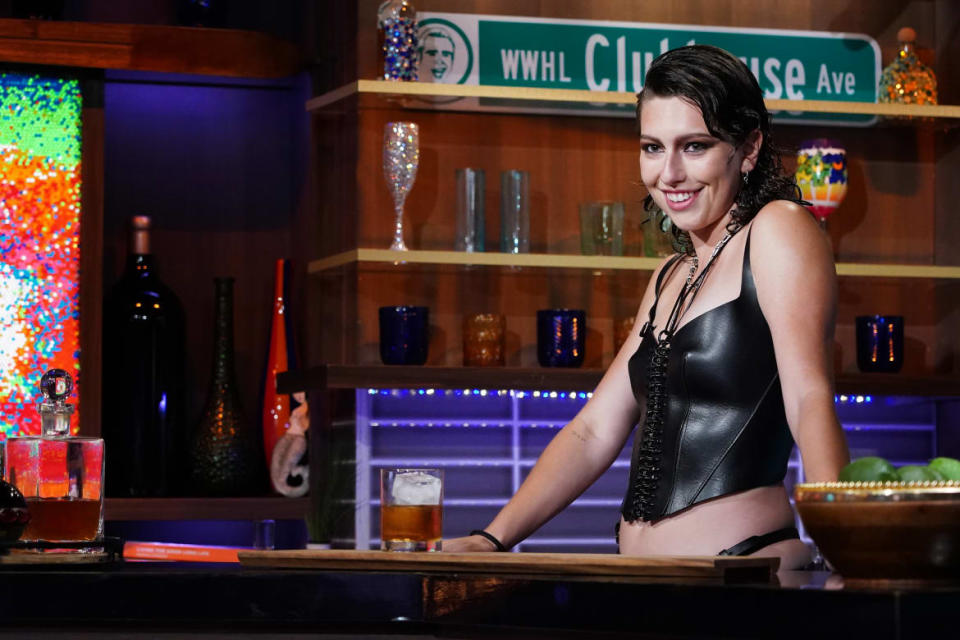King Princess Doesn’t Want to Crank Out Bullsh*t

- Oops!Something went wrong.Please try again later.
It’s nearly 4 p.m., and I have no idea where King Princess is. We were supposed to meet on Zoom 45 minutes ago but, right now, I remain the only one in the room, alternating between looking over my notes and staring at myself on the screen, trying to manifest her appearance.
An hour passes, and a quick email from her team reveals that they’re not sure what happened to her, either. It could be a simple miscommunication or something to do with the Instagram story she posted the night before, where she was out with friends who were taking shots. Whatever the circumstances, I chalk it up to being young and part of the industry’s game. I haven’t forgotten what it was like to be 23 years old in New York City, but I never had the added pressure of balancing record promotion along with it.
When we finally speak two days later, King Princess—whose real name is Mikaela Straus—is yawning. “I don’t know why I agreed to 10:30 am, bold choice on my part,” she says with a laugh.
We don’t mention our previously scheduled interview; I’ve already accepted the mistaken absence as a rock-star move on her part. And a rock star she is. Even with her camera off, I can feel Straus’ intimidating presence. She’s wildly confident, hardly ever pausing to make sure that what she tells me is exactly what she wants to be saying. I’m impressed by her assuredness, given the amount of blowback she’s received for things she’s said in her relatively short time in the public eye.
Soccer Mommy and the Unexpected Healing of ‘Sad Girl Music’
But King Princess has earned her conviction. She’s spent the last two years hard at work on her sophomore album, Hold On Baby, out July 29. During that time, she isolated along with the rest of the world during the pandemic, holing up at home in New York and looking deeper into her own emotions than she had on her 2019 debut, Cheap Queen.
“This record, it took a lot of time to make. As it should because I’m not just trying to crank out bullshit,” Straus tells me. “I wanted this record to be exponentially better than anything I’ve ever done, and I’ve only done this once before, so I had a lot of room to grow.”
Though she may only have one proper album under her belt, Straus has been plugging away as King Princess for her entire adult life. Her first single, an ode to Patricia Highsmith’s novel The Price of Salt called “1950,” was released at the top of 2018 when Straus was just barely 19. That song became a massive hit, going platinum in the United States and charting around the world. It was followed a few months later by her debut EP, Make My Bed, which won her acclaim with indieheads and critics alike.
Straus’ star was rising steadily. Cheap Queen earned her more positive reviews and a headlining tour in the fall of 2019. In February 2020, she re-released the album with a new set of deluxe tracks ahead of her opening slot on Harry Styles’ spring tour. But three weeks later, her steady two-year momentum came to a crashing halt when the world went into lockdown.
“It definitely was not fun to have to put your shit on pause,” Straus says. “It was the great reckoning to some degree because I have to sit with my thoughts and there’s nothing to keep me busy. I have to sit down and think about what the fuck I’m feeling. But it shaped the development of Hold On Baby because I think it’s a lot more of an introspective album than anything I’ve ever made before and that is 100 percent because I actually had to think about myself.”
The result is King Princess’ finest work to date, a 12-track exploration of self and stardom that oscillates between introspective snapshots of life (“I Hate Myself, I Want to Party,” “Winter is Hopeful”) and stadium-sized, snarling kiss-offs to dead relationships and industry heads (“Let Us Die,” “Too Bad,” “Dotted Lines”).
Across the album, Straus channels her own discontentment with herself into her boldest art yet, a sort of symbolic reassurance to her beloved, recently-passed grandparents (who are represented by the owl on the album’s cover art) that she’s found a path forward. It’s firm proof that, in an industry that commodifies identity, talent always wins out in the end—especially if you put your whole heart into it. After spending the first five years of her career trying to prove to a major label that she was more than just a token queer musician, Hold On Baby is the record that transforms King Princess into a bonafide artistic supernova.
It is, as the kids (and King Princess) might say, a “moment.”

Straus’ voice is bigger than it has ever been, and there’s plenty of room on Hold On Baby for her to lay into the mic.
“Yes! I’m a sing-errr,” Straus exclaims, affecting a pseudo-Valley Girl lilt when I ask her about the vocals on the record. “I’m so usually entranced by being in the studio that I forget the power that I can deliver vocally is more than I give myself credit for. To me, that wouldn't have been possible without the help of these guys.”
The guys she’s referring to are Hold On Baby’s tight-knit group of co-writers, co-producers, and engineers, who Straus credits with helping to shape the record’s identity. Perhaps most notably is Aaron Dessner, known by many for his decades of acclaimed work with his band, The National, while others are recent inductees into his fandom after his highly-publicized work on Taylor Swift’s 2020 pair of albums, folklore and evermore.
In early 2021, Straus flew out to Dessner’s home studio in upstate New York to camp out for some sessions together, where she became immensely close with him and his family. The second time she met to finish their tracks, Straus had a fresh set of stitches in her hand. She had injured herself in a minor accident at home, and her first set of stitches had gotten infected. Now, she was nursing round 2.
“But she was super fierce, she was giving,” Straus assures me of Nurse #1. A few weeks later, on remote land far from urgent care, Straus sat at Dessner’s kitchen table, where his wife, also a nurse, removed her stitches. “I immediately jumped in a pond, which felt like maybe not the right choice for this stitched hand,” Straus says. “But I did try to keep it above water!”
MUNA Makes This the Best Pride Month Ever With Its Gorgeously Queer New Album
That kind of impulsiveness is what makes King Princess such a beloved figure to her fans. She is someone who says and does what she wants, the ire of the public be damned.
It’s a trait that has gotten her into hot water more than a few times in the last few years. She’s been criticized for asking fans for their Juuls and weed at her concerts, with internet “sleuths” citing her family’s wealthy background as the reason she should never jokingly ask for anything she could buy herself. On her father’s side, Straus is the great-great-granddaughter of Isidor Straus, who was a co-owner of Macy’s until his death on the Titanic in 1912 alongside his wife, Ida. Yes, they are the elderly couple depicted in James Cameron’s Titanic, holding onto one another while water rushes into their cabin.
Despite Straus clarifying several times since her breakthrough that she is not an heiress and that her family is estranged from her father’s side, she’s had a hard time shaking the false perception that her background cancels out the value of her art—and the queerness that’s embedded in it.
One 2019 review called Cheap Queen “performative queerness” for its capsule assertions of frugality on the title track, going as far as to question if Straus’ embrace of her queer identity was a branding technique. It was as if “Queer Icon” was a title she chose and not one thrust onto her by a media landscape that didn’t—and often still doesn’t—know how to contend with queer artists who dare to write with all the fearless transparency of their straight counterparts.
On Hold On Baby, King Princess mines her relationships and her own self to hold a rigid middle finger to anyone who questions her place in the industry or the veracity of her queerness. The album’s emotional centerpiece, “Change the Locks,” is a rumination on “sapphic dysfunction,” a special type of queer codependency that Straus says happens when your relationship becomes the safe space from a society that doesn’t favor you.

“When you're in a queer relationship, you’re bonded at struggle to some degree,” she says. “And I think that makes for really fruitful relationships that result in spending ample time together, [which] can be super unhealthy. Me and my girlfriend, we have these moments where we’re like, ‘Mama, we haven’t gone outside in three days.’ We get in these patterns of building something that’s insular and then you end up bickering and fighting because you’ve shut the world out.”
Much of the album examines that push and pull dynamic of Straus’ current relationship with artist and Lizzo’s creative director, Quinn Wilson. Straus tells me that she no longer has any interest in writing songs about unrequited queer love.
“There’s a lot of, like, ‘I want to kiss her, but she has a man!’ or, ‘Oh, we’re at a sleepover!’ Like, no,” she says, very matter-of-factly. “It kind of takes it beyond queer relationships and just to relationships in general. Like, you're like wearing each other’s clothes and starting fights because you started the last fight. And so…I'm gonna make another fight! You're not shutting down because you don't like me, because you don't love me, because we're not perfect for each other. You're changing the locks because you're fucking bored.”
Straus had no reservations about exploring the most intimate parts of her and Wilson’s relationship, going so far as to go back on a promise that she’d never put Wilson’s name in a song, which she does on “Winter is Hopeful,” or lamenting the discontentment she can feel with her own body during sex on “Sex Shop.” On the latter, Straus pleads, “Hold on, baby, angel/I will figure out my pain,” which provides a through-line for the record’s themes. “It’s self-soothing, not taking somebody else’s word for it but taking your own,” Straus says. “That’s a challenging thing to do.”
Our conversation takes a saltier turn toward the music industry when I ask to talk about “Dotted Lines,” a song about fulfilling soul-sucking contractual obligations and marketing your art. “It sounds like a song, but it hits like a Bible,” Straus sneers toward execs on the chorus.
“You’re told by whomever that you are to market and you are to expect XYZ result from this, and you are to follow statistics and fucking pie charts,” she says. “And… I find that crippling sometimes. I know my value. I know that it has the potential to really help people. There are days where that burden of the commerce aspect [becomes] so heavy, where you're like, ‘Why am I so sad?’”
I ask her about the recent influx of artists publicly talking about how their labels are asking them to record TikToks they don’t want to make or allegedly withholding music until a certain quota of audience demand is met.
“We are expected to do TikTok, that is facts,” she says. “If that’s how you want to market then I’m into it, but this is beyond that. This is about the pressures of being somebody who is ideally making art that resonates with themselves but is then expected to sell it. I signed up for this job, so you know what? Whoops, there's a new responsibility. The bigger thing is being an emotional, living, breathing person and that’s why we are we are bought and sold. But at the same time that becomes a mental health crisis after a while because you're being told you’re worth X amount.”
I tell her that I’m curious as to how her role as a queer artist plays into the marketability, suggesting that queer artists are often marginalized down to their identity to become 0s and 1s in an algorithmic Pride playlist.
“I think it’s a double-edged sword,” she says. “The gatekeepers that be have decided it’s OK to be gay. So now you can be openly gay and an artist and you don’t get slandered and told that you’re fucked up for being queer. So now it’s marketable but it’s something you have to be extra-cognizant of when you’re offered jobs. Does this feel like I’m being asked to do this for my talent? Or am I being asked to do this because they need to fill a quota? There are these moments where I’m like, ‘Oh, that’s so icky.’ I don’t want to be covered in rainbow. And it’s also tough that I have to sit down with my managers and be like, ‘We can expect profits in June!’ Why do I have one month? Imagine telling a straight person like, ‘June’s gonna be the month for you!’”
She hesitates for just a moment while I’m laughing at her joke. “I’m grateful that I’m allowed to be me. I’ve never been told to censor myself or to make art less gay. But the reality is that sometimes the art is just identified as being gay art and I’m annoyed by that because I make art for everyone.”

Before we say goodbye, I can’t help but ask her about my favorite thing she’s ever done: chopped and screwed remixes of meme videos like The Cock Destroyers and Kim Cattral scatting that she used to post on SoundCloud. Where do those live in the trajectory of her relatively short but already expansive career?
“I am very much still that person. I spend hours that I could be promoting myself in my home studio with my friend Jack making joke music. I love to get stoned and make dumb shit. [While I was on tour] that was a huge respite. I haven't done one in a while. I really do want to remix Nicole Kidman's AMC ad.”
I gasp before begging her to make that happen. I tell her it’s exactly what the world needs right now.
“I need my friend Veronica to try to isolate the vocal because there's a lot of gorgeous string symphony happening underneath her speaking. But, like, imagine a remix where it was fully, ‘Heartbreak feels good in a place like this,’ like, DOONTZ DOONTZ DOONTZ.”
I suggest that it can open softly with the sound of Kidman’s heels hitting the puddle outside of the theater.
“Oh my God,” she laughs. At this point, we’re riffing. “The beat is made from the sound of her heels! Click-clacking up to an AMC, like that's the drum beat!”
I tell her it’s so King Princess, the perfect accompaniment to Hold On Baby and Cheap Queen.
“A three-part rock opera,” she says with one final laugh.
Get the Daily Beast's biggest scoops and scandals delivered right to your inbox. Sign up now.
Stay informed and gain unlimited access to the Daily Beast's unmatched reporting. Subscribe now.

